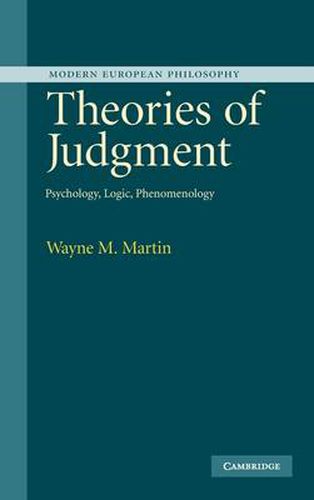Readings Newsletter
Become a Readings Member to make your shopping experience even easier.
Sign in or sign up for free!
You’re not far away from qualifying for FREE standard shipping within Australia
You’ve qualified for FREE standard shipping within Australia
The cart is loading…






The exercise of judgment is an aspect of human endeavor from our most mundane acts to our most momentous decisions. In this book Wayne Martin develops a historical survey of theoretical approaches to judgment, focusing on treatments of judgment in psychology, logic, phenomenology, and painting. He traces attempts to develop theories of judgment in British Empiricism, the logical tradition stemming from Kant, nineteenth-century psychologism, recent experimental neuropsychology, and the phenomenological tradition associated with Brentano, Husserl and Heidegger. His reconstruction of vibrant but largely forgotten nineteenth-century debates links Kantian approaches to judgment with twentieth-century phenomenological accounts. He also shows that the psychological, logical and phenomenological dimensions of judgment are not only equally important, but fundamentally interlinked, in any complete understanding of judgment. His book will interest a wide range of readers in history of philosophy, philosophy of mind, and psychology.
$9.00 standard shipping within Australia
FREE standard shipping within Australia for orders over $100.00
Express & International shipping calculated at checkout
The exercise of judgment is an aspect of human endeavor from our most mundane acts to our most momentous decisions. In this book Wayne Martin develops a historical survey of theoretical approaches to judgment, focusing on treatments of judgment in psychology, logic, phenomenology, and painting. He traces attempts to develop theories of judgment in British Empiricism, the logical tradition stemming from Kant, nineteenth-century psychologism, recent experimental neuropsychology, and the phenomenological tradition associated with Brentano, Husserl and Heidegger. His reconstruction of vibrant but largely forgotten nineteenth-century debates links Kantian approaches to judgment with twentieth-century phenomenological accounts. He also shows that the psychological, logical and phenomenological dimensions of judgment are not only equally important, but fundamentally interlinked, in any complete understanding of judgment. His book will interest a wide range of readers in history of philosophy, philosophy of mind, and psychology.